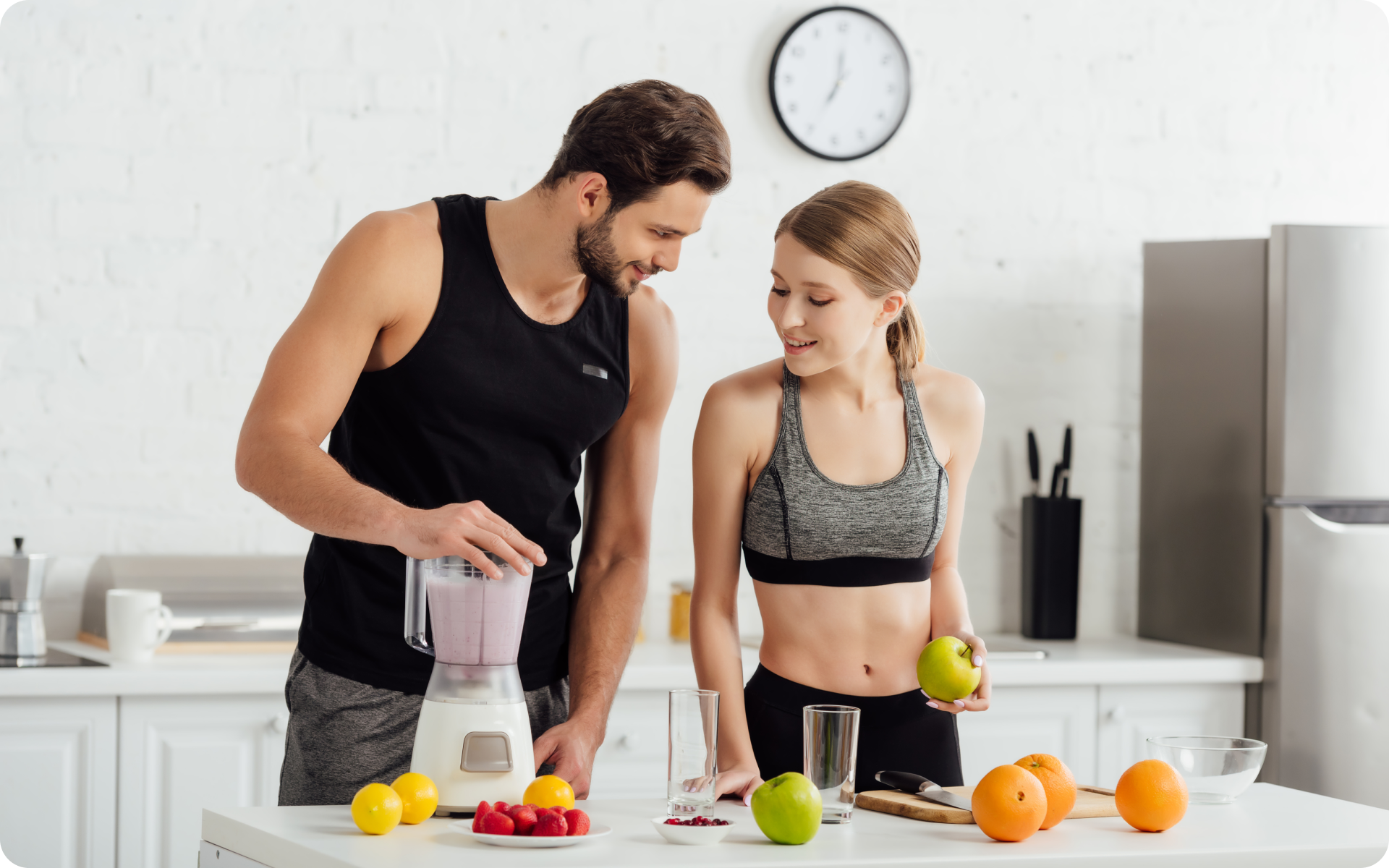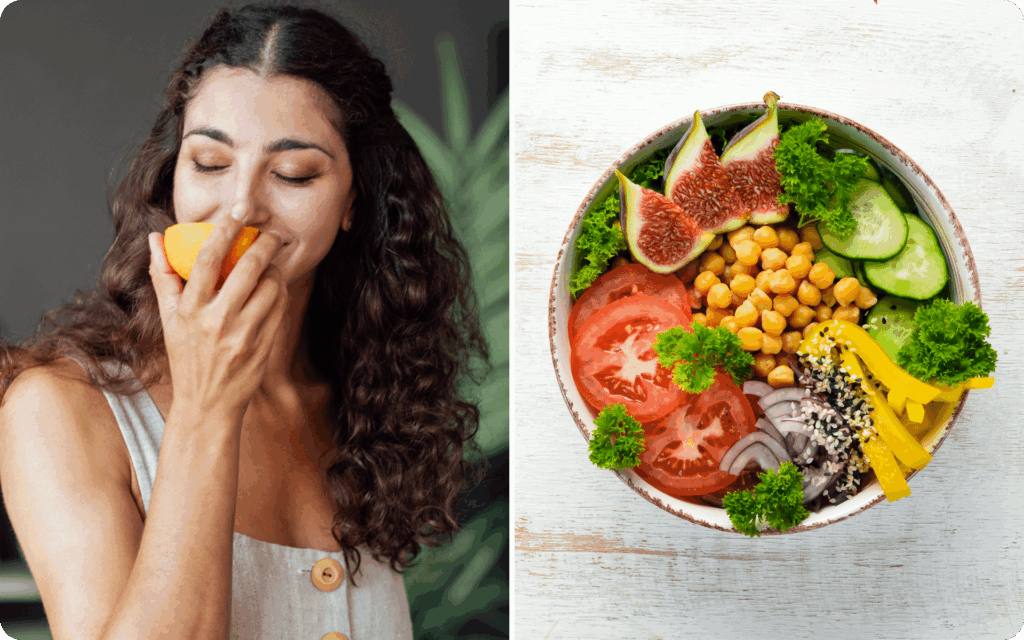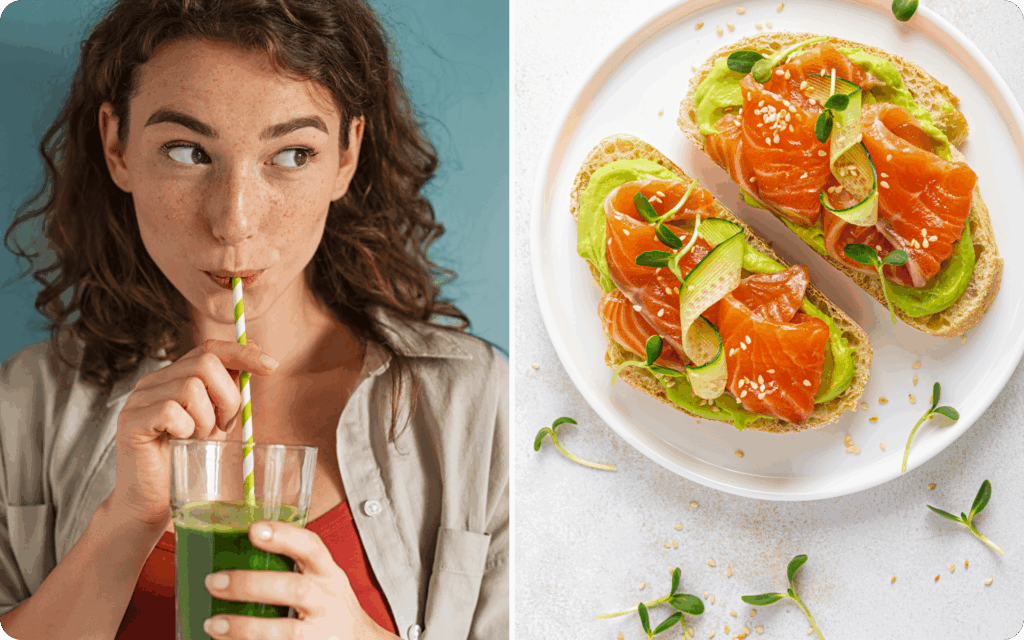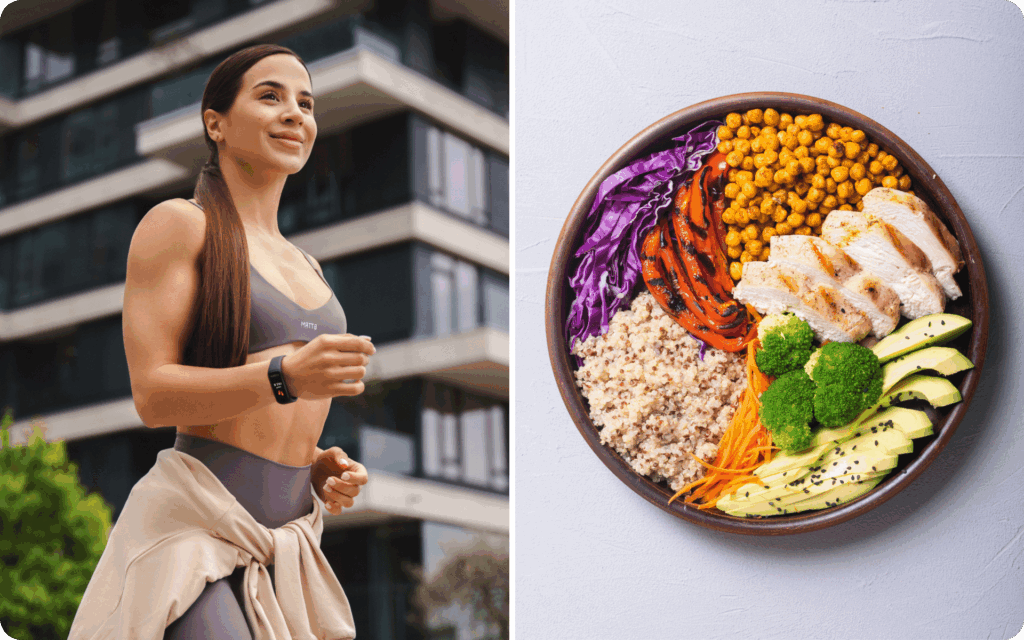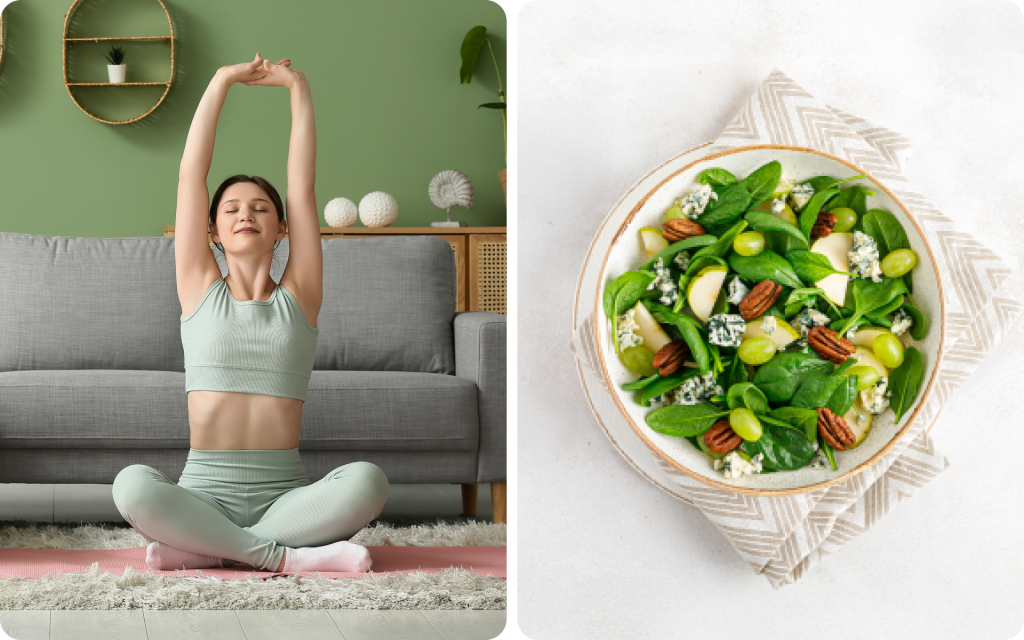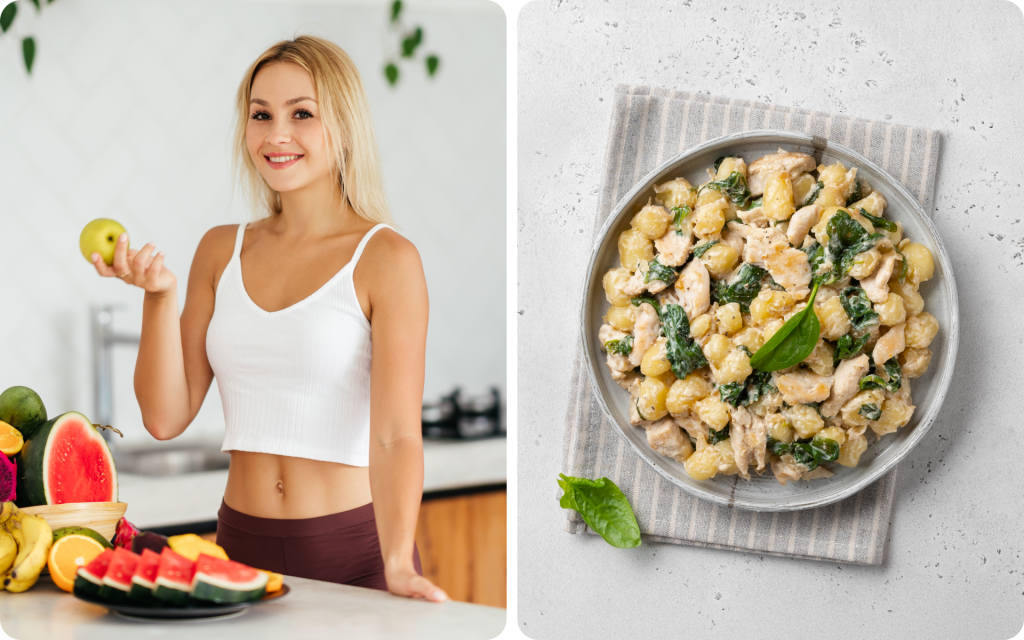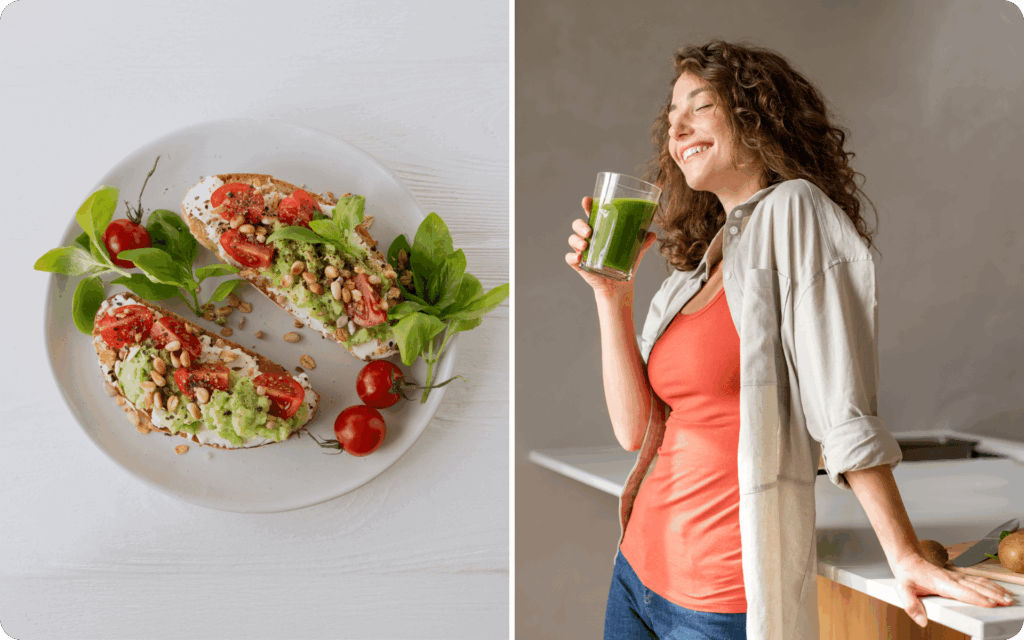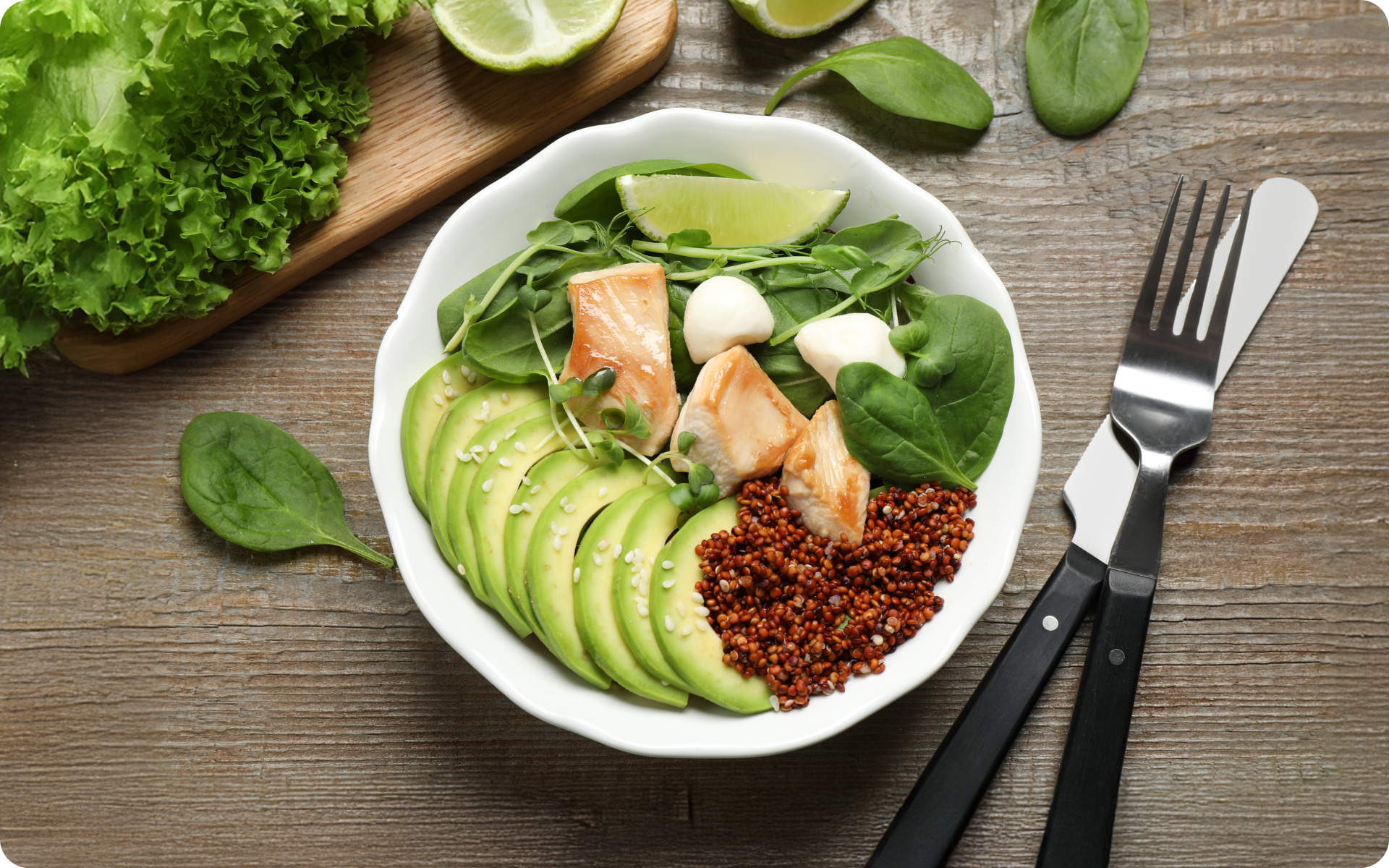Just getting into bodybuilding?
Here’s the truth most people overlook: Lifting weights is only half the battle.
If you’re not eating right, building lean muscle without gaining extra fat gets a whole lot harder.
Your training may be superior, but your nutrition is what makes it count.
Eating every 3-4 hours, especially foods that support muscle growth and energy, provides consistent fuel. For many bodybuilders, that means 5-6 meals a day, not just to feed your gains, but to avoid an energy crash halfway through the day (1).
In this article, we compiled a 7-day meal plan for muscle gain for beginners that anyone can follow. Packed with quality nutrients and easy-to-cook meals, you can tailor it to your needs and achieve the perfect physique. Let’s get straight into it.
What Should Beginners Eat In A 7-Day Muscle Gain Meal Plan?
The 7-day meal plan for muscle gain for beginners should include 5-6 meals a day with quality protein, such as lean meat, dairy, eggs, lentils, beans, nut butter, and fatty fish.
Dividing the calories into smaller meals is thought to maximize protein synthesis and retain lean muscle (2).
Your plate should contain a balance of protein, fats, and carbohydrates:
- Start with 20-40 g (0.7-1.4 oz) of protein per meal. That would be the equivalent of about 113 g (4 oz) of cooked lean ground turkey with a cup of brown rice and mixed stir-fry vegetables (3).
- Get 45-65% of your calories from carbs as a source of energy. Prioritize slow-release products throughout the day, such as whole grains and vegetables like quinoa, oats, and sweet potatoes. Just before working out, you can use faster-processing carbs like fruit and white rice, as they can provide immediate energy for your training session (4, 5).
- The rest of your calories should come from healthy fats to support testosterone levels. That means using more salmon, mackerel, nut butters, and extra virgin olive oil (6). These provide the body with quality nutrients and allow it to function correctly.
- Consume plenty of water throughout the entire day. About 20% of your fluid intake can come from your food, like fruits and veggies. But the rest should consist of drinks, such as water, tea, or other beverages low in sugar and additives. Men should drink around 3.7 liters (15.5 cups) of water a day, and women can aim for 2.7 liters (11.5 cups) a day, but this could vary based on individual factors, activity level, and environment (7).
Read more: How to Build a Healthy Dinner Plate, According to Experts
How Many Meals Per Day Are Best For Beginner Muscle Growth?
Eating every 3-4 hours, 5-6 meals a day, can keep your energy steady and help avoid that mid-day crash. You can include muscle-building products, like lean beef, turkey, chicken, tuna, and cottage cheese (1).
However, it’s not just about how often you eat; it’s also about when you eat and what your eating habits look like throughout the day.
Things like eating breakfast, how you spread your calories across meals, your total calories, and snacking all play a role (8).
For example, in half a cup (109 g) of cottage cheese, you get 12 g of protein, 4.7 g of fat, and 107 calories. By combining it with 1 oz (28 g) of whole grain toast, you get an extra 87 calories and 4.6 g of protein. These foods provide a hefty dose of protein, great for muscle building. For more details about the muscle building meal plan, take a look at our prior publication.
Studies suggest that adding more protein to your daily diet can lead to small boosts in lean muscle and lower-body strength when you’re doing resistance training. It may also slightly improve bench press performance (9).
Your stomach might handle smaller, more frequent meals better, as they are less likely to overwhelm the digestive tract. This meal-dispersing method can be an efficient strategy, especially if you struggle with bloating, discomfort, or other stomach issues, or just need a large total amount of food to meet your daily calorie and protein needs.
The 7-day meal plan for muscle gain for beginners should include a variety of snacks.
They keep you fuller for longer and build muscle mass (10). For example, 2 tablespoons (32 g) of peanut butter with a handful of peanuts provides about 12 g of protein or more.
The BetterMe: Health Coaching app will provide you with a host of fat-frying fitness routines that’ll scare the extra pounds away and turn your body into a masterpiece! Get your life moving in the right direction with BetterMe!
How Much Protein Do Beginners Need Daily For Muscle Gain?
You might aim to consume anywhere from 20-40 g (0.7-1.1 oz) of protein at each meal, or determine your total protein target for the day and divide it accordingly.
Instead of trying to get most of your protein from a single meal, try dispersing it across various meals and snacks to promote muscle recovery, growth, and energy (11).
The majority of your protein needs should come from whole foods, rather than supplements, especially so that you are getting enough energy and exercise to build lean mass.
Here are a couple of examples you can add to your gym diet plan for muscle gain:
- A smoothie with 1/2 cup of peanut butter, 1 banana, 2 cups of milk, and a tablespoon of honey provides a little over 40 g of protein.
- A bowl of lentil soup with whole wheat rolls offers roughly 25-30 g of protein.
- A cup of cottage cheese with 1/2 cup of strawberries and 1/4 cup of almonds has roughly 30-35 g of protein.
- Cooking 5 ounces (140 g) of lean ground beef with 1 cup of quinoa and mixed peppers offers about 35-40 g of protein.
What’s The Easiest Way To Hit Protein Goals As A Beginner?
Here are a couple of strategies that can help when creating your 7-day meal plan for muscle gain for beginners.
- Prioritize Protein At Every Meal
Always add ingredients with high amounts of protein, whether it is a main meal or a snack. Instead of treating the protein like an “add-on”, build your plate around it.
Some foods you can use as a base for additional protein are eggs, poultry, seafood, dairy, lean meats, legumes, and soy products.
- Choose Healthy Snacks
When you want snacks, skip the chips and candy and go for more sustainable, quality nutrients, such as celery sticks with peanut butter, Greek yogurt with almonds and fruits, or deviled eggs with mustard, mayonnaise, and seasonings.
- Meal Prepping
Meal prep for weight loss and muscle gain can be highly beneficial. You can use it to control the calorie and protein intake.
Preparing meals in advance reduces the likelihood of skipping a meal or consuming something that doesn’t meet your needs. Meal prepping can support muscle recovery and growth.
- Use Protein Shakes Strategically
Protein powders, such as casein or whey, can quickly add 20-30 g of protein, primarily when used in shakes, helping you meet macro goals when whole foods aren’t enough.
These supplements can help support performance, protein intake, and muscle mass (12).
However, you must be careful not to overindulge.
For example, most experts suggest 1-2 scoops (25 to 50 g) of whey protein a day, often after working out. Too much whey protein can lead to digestive complications, such as pain, cramps, flatulence, nausea, and diarrhea (13).
- Track Your Progress
Choose foods that offer a lot of protein without much saturated fat, such as lean meats, skinless poultry, seafood, and plant-based proteins. If you want to be more precise, the BetterMe fitness app can track everything for you. Simply log in with your dietary goals and preferences to enjoy a completely personalized experience.
What Carbs And Fats Help Beginners Build Muscle?
Your muscle-building meal plan should include complex carbohydrates that take a while to digest and offer a steady source of energy. You can use them to prevent energy crashes and give the muscles the fuel they need to stay engaged during workouts.
The best sources of complex carbs include:
- Whole Grains: Steel-cut or rolled oats, brown rice, quinoa, whole-wheat bread/pasta, barley, farro.
- Starchy Vegetables: Sweet potatoes, yams, butternut squash, corn, peas, etc.
- Legumes: Lentils, black beans, chickpeas, and kidney beans.
If you plan to use simple carbs that digest quickly, incorporate them strategically into your exercise routine. This way, you can get a quick burst of energy without compromising your weight management.
When it comes to weight loss, progress is made by inches, not miles, so it’s much harder to track and a lot easier to give up. The BetterMe: Health Coaching app is your personal trainer, nutritionist, and support system all in one. Start using our app to stay on track and hold yourself accountable!
The best sources of simple carbs include:
- Fruits: Bananas, berries, apples, oranges, grapes.
- Vegetables: White potatoes, pumpkin, spinach.
- White grains: Rice, bread, couscous.
Overall, limit saturated and trans fats, such as fatty cuts of red meat or ultra-processed foods. The majority of your carbohydrates should come from starchy vegetables and whole grains, plus legumes, and include healthier sources of omega-3 fatty acids, like olive oil, nuts, avocados, and fatty fish.
What Is An Example Of 7-Day Meal Plan For Muscle Gain For Beginners?
This meal plan is a general template. You can adjust the portions and ingredients based on the amount of calories you should consume and the vitamins or minerals you need in higher amounts.
Day 1
- Breakfast: Scrambled eggs with spinach, whole-grain toast, and Greek yogurt with mixed berries.
- Snack: Protein shake with a medium banana.
- Lunch: Roasted turkey with quinoa and steamed zucchini.
- Snack: Apple slices with peanut butter.
- Dinner: Salmon fillet with farro, cabbage slaw, and roasted asparagus.
- Evening Snack (Optional): Cottage cheese with sliced strawberries.
Day 2
- Breakfast: Oatmeal mixed with protein powder, sliced banana, and peanut butter.
- Snack: Walnuts and a pear.
- Lunch: Turkey and avocado wrapped in a whole wheat tortilla with mixed greens.
- Snack: Hard-boiled eggs with an apple.
- Dinner: Beef sirloin stir-fry with red bell peppers, brown rice, and broccoli florets.
- Evening Snack (Optional): Protein smoothie with spinach, mixed berries, and protein powder.
Day 3
- Breakfast: Protein pancakes with cinnamon, oats, banana, and maple syrup.
- Snack: Greek yogurt with granola and a pear.
- Lunch: Grilled tofu over wild rice with roasted asparagus.
- Snack: Hummus with whole-grain crackers and cucumber slices.
- Dinner: Baked cod with roasted carrots, bell peppers, and quinoa.
- Evening Snack (Optional): A handful of almonds with a boiled egg.
Day 4
- Breakfast: Whole-grain cereal with milk, berries, and a hard-boiled egg.
- Snack: Protein bar and a banana.
- Lunch: Stuffed chicken breasts with mushrooms, spinach, and feta cheese, served over brown rice.
- Snack: Cottage cheese with pineapple chunks.
- Dinner: Lean pork tenderloin with steamed green beans and sweet potato mash.
- Evening Snack (Optional): Greek yogurt parfait with granola and berries.
Day 5
- Breakfast: Scrambled eggs and smashed avocado over whole-grain toast.
- Snack: Mixed nuts with an orange.
- Lunch: Minced turkey with black beans, brown rice, grilled bell peppers, and salsa.
- Snack: Protein pudding with sliced kiwi.
- Dinner: Beef and vegetable curry with basmati rice.
- Evening Snack (Optional): Trail mix with a variety of nuts and dried fruits.
Day 6
- Breakfast: Omelet with cherry tomatoes, cheese, baby spinach, and whole grain toast.
- Snack: Rice cakes with chia seeds, pumpkin seeds, and almond butter.
- Lunch: Skinless chicken breasts with blue cheese and red wine vinegar served over lettuce and tomatoes with farro.
- Snack: Blueberries and blackberries with cottage cheese.
- Dinner: Baked tilapia with sweet potato wedges and steamed green beans.
- Evening Snack (Optional): Protein shake (whey protein with coconut milk and banana).
Day 7
- Breakfast: Poached eggs on whole-grain toast with avocado, olive oil, and sliced tomatoes.
- Snack: A protein bar with almonds and walnuts.
- Lunch: Quinoa bowl with black beans, corn, avocado, and salsa.
- Snack: Greek yogurt with peanut butter and apple slices.
- Dinner: Prawn stir-fry with brown rice and mixed greens.
- Evening Snack (Optional): Melon with high-protein yogurt.
Read More: Clean Eating Challenge: A Simple Guide To Kickstart Your Journey
Can Beginners Gain Muscle Without Eating Meat?
Yes, beginners can build muscles without eating meat. While animal proteins like meat, dairy, and eggs are a complete source of protein, plant-based protein can also help you meet your macro goals. The meals should include essential amino acids and include a variety of different sources, such as hummus, beans, and whole grain bread.
Without enough calories, your body won’t have the energy to build muscle, even with protein. Vegan or vegetarian diets can keep you full, but are often lower in calories, so you might want to consider adding more nut butter, seeds, avocados, and olive oil.
You can add protein powder, oats, and fruits to your smoothies.
Here are some meat-free options to include in a 7-day meal plan for muscle gain for males and a 7-day meal plan for muscle gain females:
| Legumes | Soy Products | Grains | Nuts and Seeds | Vegetables | Plant-Based Protein Powders |
|---|---|---|---|---|---|
| Lentils, chickpeas, black beans, kidney beans, peas, etc. | Tofu, tempeh, natto, soy milk, edamame | Quinoa, oats, brown or wild rice, whole-grain pasta, whole-wheat bread, farro | Almonds, walnuts, peanuts, chia seeds, flax seeds, hemp seeds, pumpkin seeds, nut butters | Spinach. broccoli, bell peppers, etc. | Pea protein, rice protein, soy protein |
What Exercises Go Well With A Muscle-Building Plan?
To build more muscle, you need to pair these meals with the right workouts, such as squats, deadlifts, bench presses, and overhead presses.
They challenge multiple muscle groups with targeted training. Eating protein and carbs before and after your workout gives your body what it needs to perform, recover, and grow stronger.
Here are a couple of exercises that go well with your muscle-building meal plan:
- Compound exercises: Your fitness routine should include exercises that train more muscle groups at once, such as squats, bench presses, deadlifts, and pull-ups. These build strength throughout the entire body and shape muscles for bulkier results.
- Isolation exercises: These strength training movements, such as bicep curls, leg extensions, and calf raises, target a specific joint or a muscle group. They are effective for shorter and frequent training bursts.
Slowly increasing the reps, sets, and weight over time challenges the body and gives the muscles enough time to adapt. With progressive overload, rest, and recovery, you can increase your endurance and become capable of more challenging, more demanding workouts. If you’re curious about the best bulking foods, check out our earlier article.
Beginners should slightly reduce calories on rest days by lowering carbohydrate and/or fat intake while keeping protein high to support recovery. Since you spend less energy when resting, adjusting the calorie intake prevents you from gaining fat, while still fueling muscle repair. Beginners can start to see muscle gains within 4-6 weeks of consistent training and proper nutrition. First, your brain starts engaging more muscle fibers, and after the first month of resistance training, you may begin to see actual changes in muscle shape and size. However, individual experiences may vary. If a beginner struggles to eat enough calories, they should increase calorie density by adding healthy fats, drinking liquid meals, and eating more frequent meals. Calorie-dense options like nuts, oils, and shakes help meet intake goals without overwhelming your stomach. A beginner can gain muscle by eating only 3 meals daily if they meet their total protein and calorie needs. Each meal should include at least 20-40 g of protein to stimulate muscle protein synthesis and support recovery.Frequently Asked Questions
Should beginners eat differently on rest days?
How soon can beginners see muscle gains?
What if a beginner struggles to eat enough calories?
Can a beginner gain muscle by eating only 3 meals daily?
The Bottom Line
Your muscle-building meal plan should come with a balance of nutrients, including carbs, proteins, and healthy fats. Dispersing the protein between 5 and 6 meals daily can set you on the right track. The amount of calories you consume varies based on your fitness goals and can change over time. Pair the diet with active resistance training and progressive overload, and you can enjoy a healthy fitness routine.
DISCLAIMER:
This article is intended for general informational purposes only and does not serve to address individual circumstances. It is not a substitute for professional advice or help and should not be relied on for making any kind of decision-making. Any action taken as a direct or indirect result of the information in this article is entirely at your own risk and is your sole responsibility.
BetterMe, its content staff, and its medical advisors accept no responsibility for inaccuracies, errors, misstatements, inconsistencies, or omissions and specifically disclaim any liability, loss or risk, personal, professional or otherwise, which may be incurred as a consequence, directly or indirectly, of the use and/or application of any content.
You should always seek the advice of your physician or other qualified health provider with any questions you may have regarding a medical condition or your specific situation. Never disregard professional medical advice or delay seeking it because of BetterMe content. If you suspect or think you may have a medical emergency, call your doctor.
SOURCES:
- Nutrition Recommendations for Bodybuilders in the Off-Season: A Narrative Review (2019, nih.gov)
- Evidence-based recommendations for natural bodybuilding contest preparation: nutrition and supplementation (2014, nih.gov)
- How much protein do you really need to get strong? (2025, bbc.com)
- 10 Fast-Digesting Carbs to Eat for a Quick Pre-Workout Boost (2025, onepeloton.com)
- Physiology, Carbohydrates (2023, nih.gov)
- Manipulation of Dietary Intake on Changes in Circulating Testosterone Concentrations (2021, nih.gov)
- Water: How much should you drink every day? (2022, mayoclinic.org)
- The Influence of Meal Frequency and Timing on Health in Humans: The Role of Fasting (2019, nih.gov)
- Systematic review and meta-analysis of protein intake to support muscle mass and function in healthy adults (2022, nih.gov)
- High-protein snacks to build muscle and keep hunger at bay (2024, harvard.edu)
- Are you eating enough protein? (2024, harvard.edu)
- Protein supplementation: the double-edged sword (2023, nih.gov)
- Whey Protein 101: The Ultimate Beginner’s Guide (n.d., healthline.com)
